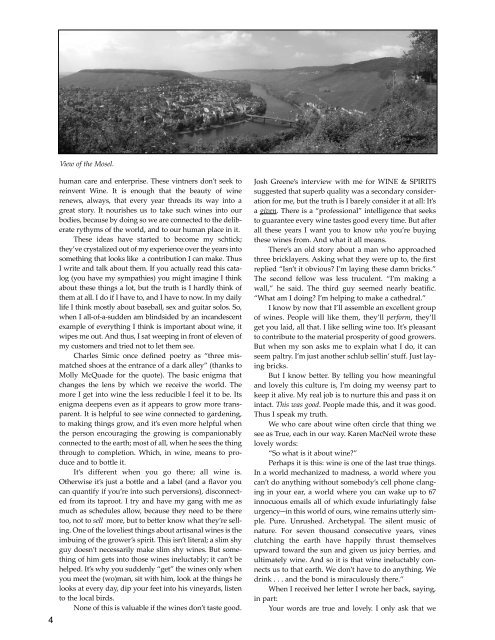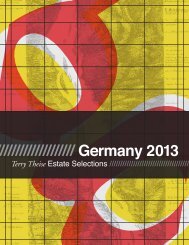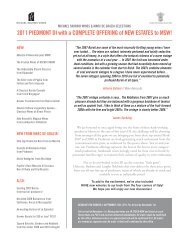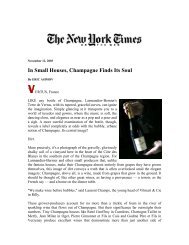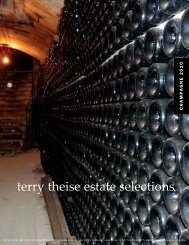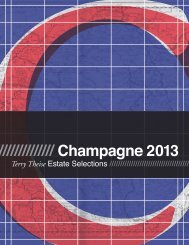German Catalog 2006 USE THIS ONE.qxp - Michael Skurnik Wines
German Catalog 2006 USE THIS ONE.qxp - Michael Skurnik Wines
German Catalog 2006 USE THIS ONE.qxp - Michael Skurnik Wines
You also want an ePaper? Increase the reach of your titles
YUMPU automatically turns print PDFs into web optimized ePapers that Google loves.
4<br />
View of the Mosel.<br />
human care and enterprise. These vintners don’t seek to<br />
reinvent Wine. It is enough that the beauty of wine<br />
renews, always, that every year threads its way into a<br />
great story. It nourishes us to take such wines into our<br />
bodies, because by doing so we are connected to the deliberate<br />
rythyms of the world, and to our human place in it.<br />
These ideas have started to become my schtick;<br />
they’ve crystalized out of my experience over the years into<br />
something that looks like a contribution I can make. Thus<br />
I write and talk about them. If you actually read this catalog<br />
(you have my sympathies) you might imagine I think<br />
about these things a lot, but the truth is I hardly think of<br />
them at all. I do if I have to, and I have to now. In my daily<br />
life I think mostly about baseball, sex and guitar solos. So,<br />
when I all-of-a-sudden am blindsided by an incandescent<br />
example of everything I think is important about wine, it<br />
wipes me out. And thus, I sat weeping in front of eleven of<br />
my customers and tried not to let them see.<br />
Charles Simic once defined poetry as “three mismatched<br />
shoes at the entrance of a dark alley” (thanks to<br />
Molly McQuade for the quote). The basic enigma that<br />
changes the lens by which we receive the world. The<br />
more I get into wine the less reducible I feel it to be. Its<br />
enigma deepens even as it appears to grow more transparent.<br />
It is helpful to see wine connected to gardening,<br />
to making things grow, and it’s even more helpful when<br />
the person encouraging the growing is companionably<br />
connected to the earth; most of all, when he sees the thing<br />
through to completion. Which, in wine, means to produce<br />
and to bottle it.<br />
It’s different when you go there; all wine is.<br />
Otherwise it’s just a bottle and a label (and a flavor you<br />
can quantify if you’re into such perversions), disconnected<br />
from its taproot. I try and have my gang with me as<br />
much as schedules allow, because they need to be there<br />
too, not to sell more, but to better know what they’re selling.<br />
One of the loveliest things about artisanal wines is the<br />
imbuing of the grower’s spirit. This isn’t literal; a slim shy<br />
guy doesn’t necessarily make slim shy wines. But something<br />
of him gets into those wines ineluctably; it can’t be<br />
helped. It’s why you suddenly “get” the wines only when<br />
you meet the (wo)man, sit with him, look at the things he<br />
looks at every day, dip your feet into his vineyards, listen<br />
to the local birds.<br />
None of this is valuable if the wines don’t taste good.<br />
Josh Greene’s interview with me for WINE & SPIRITS<br />
suggested that superb quality was a secondary consideration<br />
for me, but the truth is I barely consider it at all: It’s<br />
a given. There is a “professional” intelligence that seeks<br />
to guarantee every wine tastes good every time. But after<br />
all these years I want you to know who you’re buying<br />
these wines from. And what it all means.<br />
There’s an old story about a man who approached<br />
three bricklayers. Asking what they were up to, the first<br />
replied “Isn’t it obvious? I’m laying these damn bricks.”<br />
The second fellow was less truculent. “I’m making a<br />
wall,” he said. The third guy seemed nearly beatific.<br />
“What am I doing? I’m helping to make a cathedral.”<br />
I know by now that I’ll assemble an excellent group<br />
of wines. People will like them, they’ll perform, they’ll<br />
get you laid, all that. I like selling wine too. It’s pleasant<br />
to contribute to the material prosperity of good growers.<br />
But when my son asks me to explain what I do, it can<br />
seem paltry. I’m just another schlub sellin’ stuff. Just laying<br />
bricks.<br />
But I know better. By telling you how meaningful<br />
and lovely this culture is, I’m doing my weensy part to<br />
keep it alive. My real job is to nurture this and pass it on<br />
intact. This was good. People made this, and it was good.<br />
Thus I speak my truth.<br />
We who care about wine often circle that thing we<br />
see as True, each in our way. Karen MacNeil wrote these<br />
lovely words:<br />
“So what is it about wine?”<br />
Perhaps it is this: wine is one of the last true things.<br />
In a world mechanized to madness, a world where you<br />
can’t do anything without somebody’s cell phone clanging<br />
in your ear, a world where you can wake up to 67<br />
innocuous emails all of which exude infuriatingly false<br />
urgency—in this world of ours, wine remains utterly simple.<br />
Pure. Unrushed. Archetypal. The silent music of<br />
nature. For seven thousand consecutive years, vines<br />
clutching the earth have happily thrust themselves<br />
upward toward the sun and given us juicy berries, and<br />
ultimately wine. And so it is that wine ineluctably connects<br />
us to that earth. We don’t have to do anything. We<br />
drink . . . and the bond is miraculously there.”<br />
When I received her letter I wrote her back, saying,<br />
in part:<br />
Your words are true and lovely. I only ask that we


